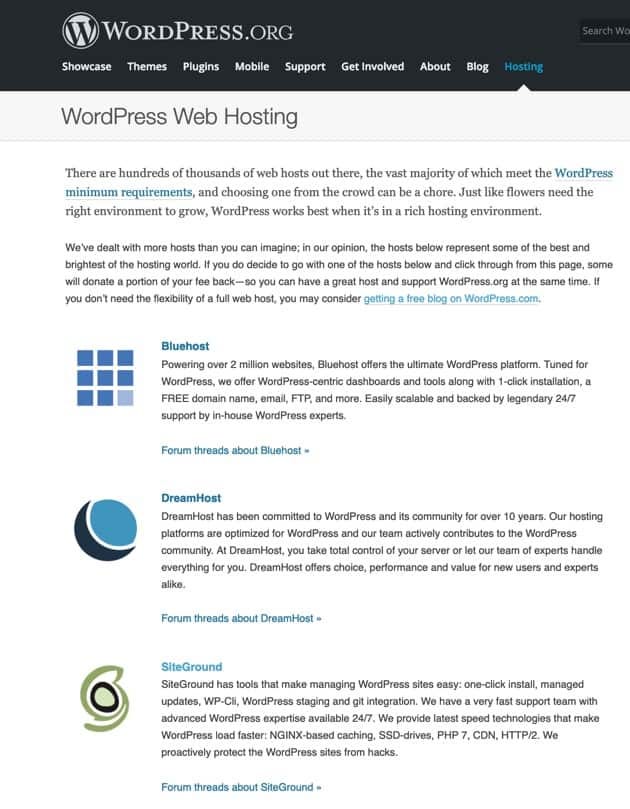Hey there! If you’re diving into building or upgrading your WordPress website in 2025, choosing the right hosting is a crucial step. With so many options out there, it can feel overwhelming to find the perfect fit. The right hosting can boost your site’s speed, keep it secure, and ensure it runs smoothly for your visitors. Whether you’re a blogger, an online store owner, or a business website manager, making an informed choice is key. Let’s explore what you need to know to pick the best WordPress hosting for your needs this year!
Key Factors to Consider When Selecting WordPress Hosting

Picking the right WordPress hosting isn’t just about grabbing the cheapest plan or the most popular provider. It’s about understanding what your website needs now—and what it might need as it grows. Here are some essential factors to keep in mind:
- Performance & Speed: Nobody likes a slow website. Look for hosts that offer fast SSD storage, optimized servers, and features like caching to ensure your site loads quickly. Tools like Google PageSpeed Insights can help you test your potential host’s performance.
- Uptime Reliability: Your site needs to be available whenever visitors come knocking. Aim for hosts with at least 99.9% uptime guarantees. Downtime can hurt your reputation and SEO rankings.
- Security Features: WordPress sites are common targets for hackers. Choose hosts that include security measures such as SSL certificates, malware scanning, firewalls, and regular backups to keep your site safe.
- Support & Customer Service: When things go wrong, you want quick and helpful support. Look for hosts with 24/7 customer service, live chat, or phone support, and check reviews on their responsiveness.
- Scalability & Resources: Will your site grow? Make sure your host can handle increased traffic and resource demands. Consider plans that allow easy upgrades without hassle.
- Ease of Use & Management: A user-friendly control panel like cPanel or custom dashboards can make managing your site simpler, especially if you’re not a tech expert.
- Pricing & Value: While it’s tempting to go for the cheapest option, weigh the features and support offered. Sometimes, paying a little more upfront saves headaches later.
In short, choosing the right WordPress hosting in 2025 is about balancing speed, security, support, and cost. Take your time to research and compare options—your website’s performance and your peace of mind depend on it!
3. Review of the Best WordPress Hosting Providers for 2025

Choosing the right WordPress hosting provider can feel overwhelming with so many options out there. To help you narrow down your choices, let’s take a closer look at some of the top providers for 2025. We’ve considered factors like speed, reliability, customer support, and overall value to give you an honest review of what each offers.
Bluehost
Bluehost continues to be a favorite among WordPress users, especially for beginners. They’re officially recommended by WordPress.org, which says a lot about their commitment to the platform. Bluehost offers one-click
SiteGround
Known for exceptional customer service and reliable hosting, SiteGround is a premium choice for WordPress sites. They’ve invested heavily in infrastructure to ensure fast speeds and minimal downtime. Their proprietary SuperCacher technology helps speed up your website significantly. SiteGround also offers managed WordPress hosting, meaning they handle updates, backups, and security for you — a huge plus if you prefer a hands-off approach. While their plans are a bit pricier, many users feel the quality justifies the cost.
WP Engine
If you’re aiming for enterprise-level performance and advanced features, WP Engine is worth considering. They specialize exclusively in managed WordPress hosting, which means top-tier security, daily backups, staging environments, and expert support. Their architecture is optimized for speed and scalability, making it perfect for high-traffic sites or businesses expecting growth. It’s more expensive than other providers, but for those who need premium performance and support, WP Engine delivers.
HostGator
HostGator offers affordable plans that are perfect for small businesses and bloggers just starting out. Their WordPress hosting plans come with one-click installs, free migrations, and unmetered bandwidth. The interface is user-friendly, and their support team is available 24/7. While they might not have all the high-end features of premium providers, HostGator still provides reliable uptime and decent speed for most small to medium websites.
DreamHost
DreamHost has been around for a long time and is known for its strong privacy policies and customer-friendly approach. Their WordPress hosting plans include a custom dashboard, automatic updates, and free SSL certificates. One of their standout features is the generous 97-day money-back guarantee, giving you plenty of time to test their service. Performance-wise, DreamHost offers good speed and uptime, making it a trustworthy option for many site owners.
4. Features and Benefits of Leading WordPress Hosting Services
Now that you have an idea of some of the top providers, let’s talk about what features really matter when choosing a WordPress hosting service. The best hosts don’t just provide space on a server—they offer a suite of features that can make managing your website easier, faster, and more secure.
Performance and Speed
Fast loading times are crucial for keeping visitors engaged and improving your SEO rankings. Leading WordPress hosts often include:
- Solid-state drives (SSDs): Faster data access compared to traditional HDDs.
- Content Delivery Networks (CDNs): Distribute your content globally for quicker load times.
- Caching technologies: Like server-side caching or built-in caching plugins to speed up your site.
Security Features
Keeping your website safe from cyber threats is essential. Top hosts provide:
- SSL certificates: To encrypt data and build trust with visitors.
- Regular backups: Automatic backups that restore your site if something goes wrong.
- Malware scanning and removal: To detect and eliminate security threats.
- Firewall and DDoS protection: To defend against malicious attacks.
Ease of Use and Management
Managing your WordPress site shouldn’t be complicated. Leading hosts typically include:
- One-click WordPress install: Simplifies setup process.
- Custom control panels: User-friendly dashboards for managing files, databases, and domains.
- Automatic updates: Keep WordPress core, themes, and plugins current without manual effort.
- Staging environments: Test changes safely before going live.
Customer Support
Even the most experienced users need help sometimes. The best hosting providers offer:
- 24/7 support: Via live chat, phone, or ticket systems.
- Expertise: Support staff familiar with WordPress-specific issues.
- Knowledge bases and tutorials: Resources to troubleshoot common problems on your own.
Pricing and Scalability
Lastly, consider your budget and future growth. Leading hosts often have tiered plans, making it easy to upgrade as your website expands. Look for:
- Affordable entry-level plans: For beginners and small sites.
- Flexible upgrades: Options to add resources without migrating to a new host.
- Money-back guarantees: So you can test services risk-free.
In summary, the best WordPress hosting services combine speed, security, ease of use, and excellent support. When selecting a provider, think about your specific needs, your budget, and how much traffic you expect. The right hosting partner can make a huge difference in the success and growth of your website in 2025 and beyond.
5. Performance, Security, and Support Comparison
When choosing a WordPress hosting site, performance, security, and support are the pillars that can make or break your website experience. Let’s dive into what really matters in these areas so you can pick the best host for your needs.
Performance
Fast-loading websites are crucial — they keep visitors happy and help your SEO rankings. Top WordPress hosts typically offer:
- Solid Infrastructure: Look for hosts that use the latest hardware, SSD storage, and scalable resources.
- Content Delivery Networks (CDNs): Many providers include CDN integration to speed up global access.
- Optimized WordPress Environment: Features like server-level caching, automatic image optimization, and lightweight configurations can drastically improve load times.
Compare different hosts based on their speed test results, uptime guarantees (aim for 99.9% or higher), and whether they offer tools to help you troubleshoot performance issues.
Security
Security isn’t just about preventing hackers — it’s about safeguarding your content and your visitors’ data. Leading WordPress hosts often include:
- Free SSL Certificates: Encryption is a must-have for any website handling user data.
- Automatic Backups: Daily or weekly backups ensure you can restore your site quickly if something goes wrong.
- Malware Scanning & Removal: Some hosts proactively scan for threats and offer cleanup services.
- Firewall and DDoS Protection: To block malicious attacks before they reach your site.
Check reviews or host documentation to verify their security measures. A good host should also have clear security policies and timely updates to patch vulnerabilities.
Support
Even the best hosting can encounter issues. That’s why reliable support is essential. Consider:
- Availability: 24/7 support via live chat, phone, or ticketing systems ensures help when you need it most.
- Knowledge Base & Tutorials: Comprehensive resources help you troubleshoot common issues yourself.
- Response Time & Expertise: Look for hosts with fast response times and staff who understand WordPress inside out.
Some hosts also offer premium support plans with dedicated account managers or WordPress specialists, which can be a lifesaver if your site is critical to your business.
6. Pricing Plans and Value for Money
Price is often a big factor in choosing a WordPress host, but it’s important to look beyond the sticker price and evaluate the value you’re getting. Here’s how to assess pricing plans effectively:
Different Pricing Tiers
Most hosting providers offer multiple plans, typically including:
- Shared Hosting: Budget-friendly, suitable for small blogs or beginner websites. Expect limited resources and fewer features.
- Managed WordPress Hosting: Slightly pricier, but includes optimized environments, automatic updates, security features, and expert support.
- VPS or Dedicated Hosting: For larger sites with high traffic, offering dedicated resources and customization options.
What’s Included in the Price?
When comparing plans, consider the following:
| Feature | What to Check |
|---|---|
| Storage & Bandwidth | Ensure it meets your current needs and allows for growth. |
| SSL Certificates | Are they free or paid? Free certificates add value. |
| Backups & Security | How often are backups taken? Are security features included? |
| Support | Is 24/7 support included? Are premium support options available? |
| Migration Assistance | Does the host offer free migration to save you time and headache? |
| Renewal Costs | Introductory prices are often lower; check renewal rates to avoid surprises. |
Value for Money
Ultimately, the goal is to find a host that offers the best features, performance, and support at a price that makes sense for your budget. Sometimes paying a little more upfront can save you money long-term by reducing downtime, security breaches, or the need for frequent upgrades.
Look for hosts that bundle essential features without upselling you on unnecessary add-ons. Also, check for customer reviews regarding reliability and customer service — a cheaper plan isn’t worth much if you’re constantly battling technical issues.
In summary, weigh the features against the costs, and don’t forget to consider future growth. A good hosting provider should be a partner in your website’s success, offering both value and peace of mind.
7. How to Optimize Your WordPress Site on Your Hosting Platform
Once you’ve chosen the perfect hosting platform for your WordPress site, the next step is to make sure your website runs smoothly, loads quickly, and provides an excellent user experience. Optimization isn’t just about installing a few plugins; it’s a multi-layered process that involves several best practices.
Start with a solid foundation: Ensure your hosting environment is optimized for WordPress. This includes using the latest PHP version, enabling HTTP/2 if available, and configuring server settings for optimal performance.
Use caching wisely: Caching reduces the load on your server and speeds up page delivery. Install reliable caching plugins like WP Rocket or W3 Total Cache. Make sure to configure cache settings properly—caching pages, browsers, and database queries as needed.
Optimize images: Large images can significantly slow down your website. Use tools like TinyPNG or Smush to compress images without losing quality. Consider serving images in modern formats like WebP for faster loading times.
Leverage a Content Delivery Network (CDN): CDNs distribute your website’s static assets across global servers, so visitors load your site from the closest location. Popular options include Cloudflare and StackPath. This reduces latency and enhances user experience worldwide.
Minimize and combine CSS/JavaScript files: Reducing the number of HTTP requests helps your site load faster. Use plugins or manual methods to minify and combine CSS and JS files, but be cautious not to break your site’s functionality.
Database optimization: Over time, your WordPress database accumulates overhead. Regularly clean up post revisions, spam comments, and transient options. Plugins like WP-Optimize can automate this process.
Keep everything updated: Regular updates to WordPress core, themes, and plugins ensure security and performance improvements. Outdated components can slow your site or introduce vulnerabilities.
Monitor performance: Use tools like Google PageSpeed Insights, GTmetrix, or Pingdom to analyze your site’s speed and identify bottlenecks. Address issues such as render-blocking resources or oversized images.
Remember, optimization is an ongoing process. Regularly review your site’s performance, stay updated with best practices, and don’t hesitate to experiment with new tools or configurations. With a proactive approach, your WordPress site will shine on any hosting platform in 2025!
8. Conclusion and Recommendations for Choosing the Best Hosting in 2025
Choosing the right hosting provider is a critical decision that can make or break your WordPress website’s success. As we look into 2025, the hosting landscape continues to evolve with new technologies, security features, and performance enhancements. So, what should you keep in mind when making your choice?
Prioritize reliability and uptime: Your website needs to be available whenever visitors want to access it. Look for hosts that guarantee at least 99.9% uptime, backed by solid infrastructure and support.
Performance matters: Speed influences both user experience and SEO rankings. Opt for providers offering SSD storage, CDN integrations, and optimized environments for WordPress. Don’t forget to check independent speed test results and reviews.
Security features: Cybersecurity is more important than ever. Choose hosts with robust security measures such as malware scanning, SSL certificates, firewalls, and regular backups.
Customer support: When issues arise, prompt and knowledgeable support can save you hours of frustration. Look for hosts offering 24/7 support via multiple channels—chat, phone, or ticket system.
Scalability and flexibility: As your site grows, you’ll want to upgrade easily. Consider hosts that offer scalable plans, easy migration options, and support for advanced features like staging environments or dedicated resources.
Cost and value: While it’s tempting to go for the cheapest option, balance cost against features and support quality. Sometimes, investing a bit more upfront can save you headaches and money down the line.
| Hosting Type | Best For | Key Features |
|---|---|---|
| Shared Hosting | Beginners, small blogs | Affordable, easy setup, limited resources |
| VPS Hosting | Growing sites, developers | More control, dedicated resources, moderate cost |
| Managed WordPress Hosting | Business sites, less technical users | Optimized for WordPress, automatic updates, enhanced security |
| Dedicated Servers | Large enterprise sites | Maximum control, resources, and customization |
In summary, the best hosting in 2025 will be one that aligns with your website’s needs, budget, and growth plans. Do your research, read reviews, and don’t be afraid to reach out to providers to ask questions. A smart choice now will pay off with a faster, more secure, and reliable website for years to come!


